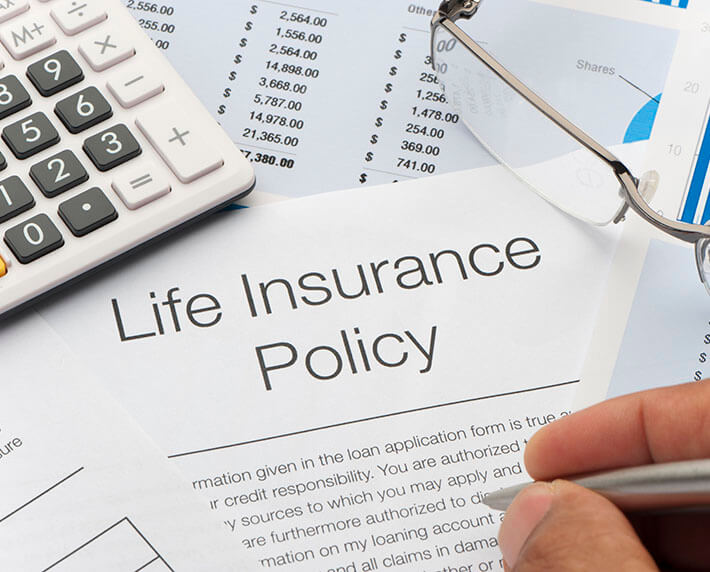Table of Contents
- Sell Your Life Insurance Policy Calculator
- How the Value of Your Life Insurance Policy Is Determined
- When It Could Be Better to Sell Your Life Insurance Policy
- When It’s Better to Hold On to Your Life Insurance Policy
- Can You Sell Your Term Life Insurance Policy for Cash?
- Life Settlements Are a Big Business
- Reasons for Selling a Life Insurance Policy
- Types of Settlement Offers
- Before You Sell, Check Your Policy’s Riders
- The Process for Selling a Policy
- Frequently Asked Questions
Sell Your Life Insurance Policy Calculator
In the life insurance business, when a policy owner sells a policy it’s known as a “life settlement.” If you’re reading this, maybe you’re considering selling a policy you have. We’re here to offer information and help you if we can.
First, know that not every policy can be sold. Whether you can sell yours will depend on a few circumstances, as well as the policy itself. The most important factors a potential buyer will consider are your health, the amount of your policy, and your life expectancy.
By using our quiz, you can find out if your policy qualifies — as well as how much you might be able to sell it for.
In most cases, to sell your policy you’ll need to:
- Be older than 65
- Have a policy worth more than $100,000
- Have some health issue(s)
- Be a U.S. citizen
The type of life insurance policy you have will also make a difference.
The typical candidate for selling a life insurance policy is someone over the age of 65 who has a policy with a face value of more than $100,000 and whose health has declined since the policy was originally issued.
How the Value of Your Life Insurance Policy Is Determined
A potential buyer will take many different factors into consideration before making an offer to buy your policy. If your policy is eligible to be sold, you can expect to receive from 10% to 35% of the amount that would be paid when you die. In certain situations, you could receive more.
A few factors that will affect the amount you may be offered:
- The face value (coverage amount) of your policy
- Your life expectancy
- The amount of premium you pay
- The market rate of return
The chart below will give you an idea of how your health status can affect the amount you could receive for your policy.
| Health condition | Type of health condition | Value of policy |
|---|---|---|
| Very Healthy | No chronic conditions | Your policy doesn’t appear to be eligible for sale |
| Some Medical Issues | Chronic but manageable conditions, such as diabetes or hypertension | 10%–25% of the death benefit |
| Serious Medical Issues | Severe conditions, such as cancer or coronary artery disease | 25%–35% of the death benefit |
| Terminal | Irreversible conditions that severely reduce life expectancy, such as late-stage cancer | 35%+ of the death benefit |
When It Could Be Better to Sell Your Life Insurance Policy
We believe that owning life insurance is responsible; however, your life can change and so can your life insurance needs.
There may come a time when you no longer need your life insurance policy, such as when your kids are grown or you have outlived your spouse.
Being able to sell your policy in those instances – rather than canceling it – is definitely a better financial decision.
| Gender | Male | Female |
|---|---|---|
| Age | 59 | 65 |
| Type of Policy | Whole life | Universal life |
| Health | Moderate | Severe |
| Coverage | $200,000 | $100,000 |
| Possible Value: | Up to $70,000 | Up to $50,000 |
When It’s Better to Hold On to Your Life Insurance Policy
Selling your life insurance doesn’t always make sense, and in some cases you can’t, even if you wanted to.
If the reasons you purchased your life insurance are still in place, such as having young children, then you’re much better off keeping your policy in place.
If selling your policy makes sense, then you must still meet certain requirements to qualify. Your age, your health, and the type of policy you have all factor into whether you’ll be able to sell your policy.
| Gender | Male | Female |
|---|---|---|
| Age | 45 | 85 |
| Type of Policy | Term life | Universal life |
| Health | Good | Severe |
| Coverage | $250,000 | $100,000 |
| Possible Value: | Does not qualify | $50,000+ |
- Answer a few simple questions.
- Get an instant online estimate.
Can You Sell Your Term Life Insurance Policy for Cash?
Insurancy is here to help you get insured. But when that insurance loses its usefulness, we can help you turn it into cash. We’ll help you find out if your policy qualifies, and we’ll make sure you get the most cash possible if you decide to sell.
Life Settlements Are a Big Business
The life settlement business has exceeded experts’ forecasts. For example, a 2016 report by Conning, a company that does insurance research, predicted annual growth in life settlements of 1%–2%.1 But the market has done far better, yielding growth rates of 34%, 50%, and 19% for 2015 through 2017.2
That same Conning report predicted that life settlements would have an average annual volume of $1.8 billion, but a report released in June 2018 showed the previous year’s volume was $2.83 billion.3
And while the Conning report forecasted transactions of about $1.7 billion in face value in 2016,4 the actual amount transacted that year was $2.5 billion.5
Reasons for Selling a Life Insurance Policy
People consider selling their life insurance policies for a variety of reasons. Here are a few situations in which you might be thinking about it as an option:
- You need cash for retirement.
- Your premiums are no longer affordable.
- You need funds for long-term care.
- You need financial help to pay for your medical bills.
- You sold a family business, or the owner retired and the insurance is no longer needed.
- You are overinsured.
- You no longer have beneficiaries.
- The term of your policy is expiring.
Types of Settlement Offers
Not all life settlements are alike. If your policy qualifies to be sold, you might choose to do a straight-up cash deal. But there are other options that might be better, depending on your situation.
Cash Offer
A lump sum of cash is offered in exchange for the policy.
Retained Death Benefit
With this type of offer, the policy owner retains a portion of the face amount of the life insurance policy. That amount can be irrevocably designated to a beneficiary chosen by the policy owner. This type of offer is usually higher than a cash offer because the amount is not paid out until the policy matures. With this type of offer, the policy owner does not have to pay premiums for the retained amount of life insurance.
Hybrid Offer
A combination of a cash offer and a retained death benefit can be used to maximize the policy’s value to the policy owner. In some cases, the best option could be a cash offer to help pay for expenses, along with a $50,000 retained death benefit to cover final expenses.
Before You Sell, Check Your Policy’s Riders
An accelerated death benefit rider can provide living benefits similar to selling your policy. In the case of a terminal or chronic illness, the rider may pay out a portion of the death benefit early.
Alternatively, a return of premium life insurance rider gives the premiums paid into the policy back at the end of the return period.
Check to see if your policy has either of these riders, as they could affect the amount you would receive in a life settlement.
The Process for Selling a Policy
- It begins with an application
Once you know that your insurance policy is eligible to be sold, the next step is to complete a life settlement application. The application will allow the party that is handling the transaction to order the required documentation. It also includes the required disclosures and authorizations that potential buyers will need to evaluate your case.The broker or company that handles your life settlement will pay the costs of gathering your medical information and several other steps involved in the sale, such as verifying coverage and obtaining life expectancy reports. Those costs — which can exceed $1,000 — become part of the amount the buyer pays for your policy.Sometimes there are custom authorizations that need to be signed during the documentation-gathering step. That can lengthen the process. - Then it goes through underwritingOnce the required documents have been collected, they go through an underwriting process. Medical summaries and life expectancy reports are created based on the medical documents that are received. Cost of insurance projections are run based on the insurer documents obtained. These underwriting documents are then used to determine how investors will price your life settlement case and what offers they will make.
- Finally, there’s the closing ProcessWhen you accept an offer, the closing process begins. A closing firm, typically a provider, will generate the contracts to be signed, including disclosures, authorizations, and releases. Parties that must sign the contracts include:
- The policy owner (you, or your trustee or authorized representative)
- The insured (if that’s someone other than you)
- Your beneficiary (individual, trustee or authorized representative)
- Your spouse (if applicable)
Once the contracts are signed and returned to the closing firm, all of the paperwork is reviewed. If everything is in order, the buyer places the purchase funds in escrow.
After escrow confirms that funds have been received, the buyer is given the insurer change forms (which you have already signed) to sign. The signed ownership and beneficiary change forms are then submitted to the life insurance carrier for processing.
Usually, within three business days of insurer confirmation letters being received (showing that the ownership and beneficiary have changed), the funds are paid out. Depending on which state you live in, you might have a rescission period in which you can back out of the transaction. When that rescission period is over, the remaining escrow amount is released to pay for closing fees, broker commissions, and referral fees

Can you sell your term life insurance policy for cash?
Insurancy is here to help you get insured. But when that insurance loses its usefulness, we can help you turn it into cash. We’ll help you find out if your policy qualifies, and we’ll make sure you get the most cash possible if you decide to sell.
Frequently Asked Questions
Can I sell my life insurance policy?
Yes. A life insurance policy is an important financial asset. The policy represents a claim to a series of potential future cash flows. Because the policy itself can be objectively categorized as an asset, this means that it necessarily ought to have some sort of monetary value.
Could I sell my life insurance policy to receive cash today?
Whether you can sell your life insurance policy depends on your personal situation and the specific characteristics of the policy. In the instance that you can sell your policy, the amount of cash you will receive depends on what the market is willing to pay (which changes over time).
How do I know if my life insurance policy is one that could be sold?
A few variables will affect your ability to sell your life insurance policy. Typically, you need to be at least 65 years old and have a policy that is expected to last longer than you are expected to live. Obviously, neither you nor your insurance company can predict the exact date of your death. Instead, this prediction is generally based on your current health and the average life expectancy for your given demographic.
What influences the value of my life insurance policy?
Many factors influence the current exchange value of your life insurance policy — for example, the total amount you are covered for, the amount (if any) of equity you have already accumulated, and the amount of premiums you still have to pay. If the premiums due are relatively low and the coverage is relatively high (typically $100,000 or above), then your policy may be a very attractive asset to certain investors.
Why would I want to sell my life insurance policy?
The most obvious reason you would want to sell your life insurance policy is that you no longer need the coverage and you would prefer to get cash for it. If you have outlived your spouse, your children are grown and financially independent, or you no longer have any financial dependents, then it might make much more sense to exchange your policy for cash instead of continuing to pay for unnecessary coverage.
When should I consider selling my life insurance policy?
Begin by asking yourself a few important questions:
- Do I still need life insurance coverage? Deciding whether you need life insurance coverage is a personal choice based on the number of dependents you have, the degree of their dependency, and the rest of your current financial situation.
- Would anybody be financially hurt in the event of my death? Whether you have a spouse, children, or other financial dependent will greatly influence the risks and benefits of selling your life insurance policy.
- Are my monthly payments worth the coverage I am paying? We all want to keep our monthly costs as low as is reasonably possible. If you don’t believe you are getting your money’s worth in coverage in exchange for the amount of premium you’re paying each month, then selling your policy might be a good idea.
- What other financial assets are in my portfolio? Life insurance is considered a financial asset, and therefore it is a part of your overall financial “portfolio.” A good portfolio is usually diversified. If this is important to you, then you may not want to have cash as your only financial asset.
- How much would it be worth to lose your life insurance coverage? This question essentially sums up all of the others. Ultimately, a life settlement (selling your policy) is going to give you money now in exchange for the benefits of your coverage in the future. Where to draw the line between what makes a good deal or a bad deal is up to you.
How much is my life insurance policy worth?
A number of factors will influence the cash value of your life insurance policy, so we can’t provide a definitive answer to that question without specific information from you. However, there are a few guidelines that can give you some ideas.
Typically, you can expect to receive about 20%-25% of your policy benefit upfront, in cash. This means that if you have a policy benefit that’s worth $200,000, then you should be able to “cash-out” for approximately $40,000-$50,000.
What is the best type of life insurance policy to sell?
The Life Insurance Settlement Agency (LISA) recognizes that institutions typically prefer to buy universal life insurance policies with benefits exceeding $100,000 from people who are older than 65. However, because there are people outside of those circumstances who want to sell their life insurance policies, there is an ample number of exceptions to those general rules of thumb.
When would I get paid?
You would get paid as soon as the necessary documents have been signed and the insurance company confirms that the owner and the beneficiary on the policy have been changed. It’s important to note that when you sell your life insurance policy you forfeit any money that would normally be paid when you die.
If I sell my life insurance policy, what happens when I die?
Unless you choose a retained death benefit or hybrid settlement offer, you give up the beneficiary rights when you sell your life insurance policy.
References
- Life Settlements, Secondary Annuities, and Structured Settlements (Conning, Inc. publication, 2016).
- Life Settlement Industry Report 2018 (Magna Life Settlements publication, 2018).
- Horowitz, Donna, “Life Settlement League Tables 2017: Market Grows 19%, Continues Upward Path,” The Life Settlement Report, June 7, 2018.
- Life Settlements (see footnote 1).
- Horowitz, “Life Settlements League Tables” (see footnote 3).
See what you qualify for by answering some health questions.










